Business Law: Contractual Remedies and Specific Performance Analysis
VerifiedAdded on 2021/04/17
|6
|1092
|66
Case Study
AI Summary
This assignment analyzes a business law case involving a breach of contract concerning the sale of a 1925 Rolls Royce. The analysis examines the remedies available to the buyer, Adam, when the seller, Edwin, a vintage car dealer, refuses to sell the car at the agreed price of $500,000 after receiving a higher offer. The assignment references key legal precedents, including Victoria Laundry (Windsor) Ltd v Newman Industries Ltd, Hadley v Baxendale, Nutbrown v Thornton, Cohen v Roche, Posner v Scott-Lewis, and Wolverhampton Corp v Emmons, to determine if specific performance is an appropriate remedy. The conclusion differentiates between the Rolls Royce and a late model Mercedes Benz, arguing that specific performance would likely be granted for the rare Rolls Royce but not for the more readily available Mercedes Benz. The assignment emphasizes the application of legal principles to determine the appropriate remedy for breach of contract in the sale of goods, considering the uniqueness of the item and the availability of alternatives.
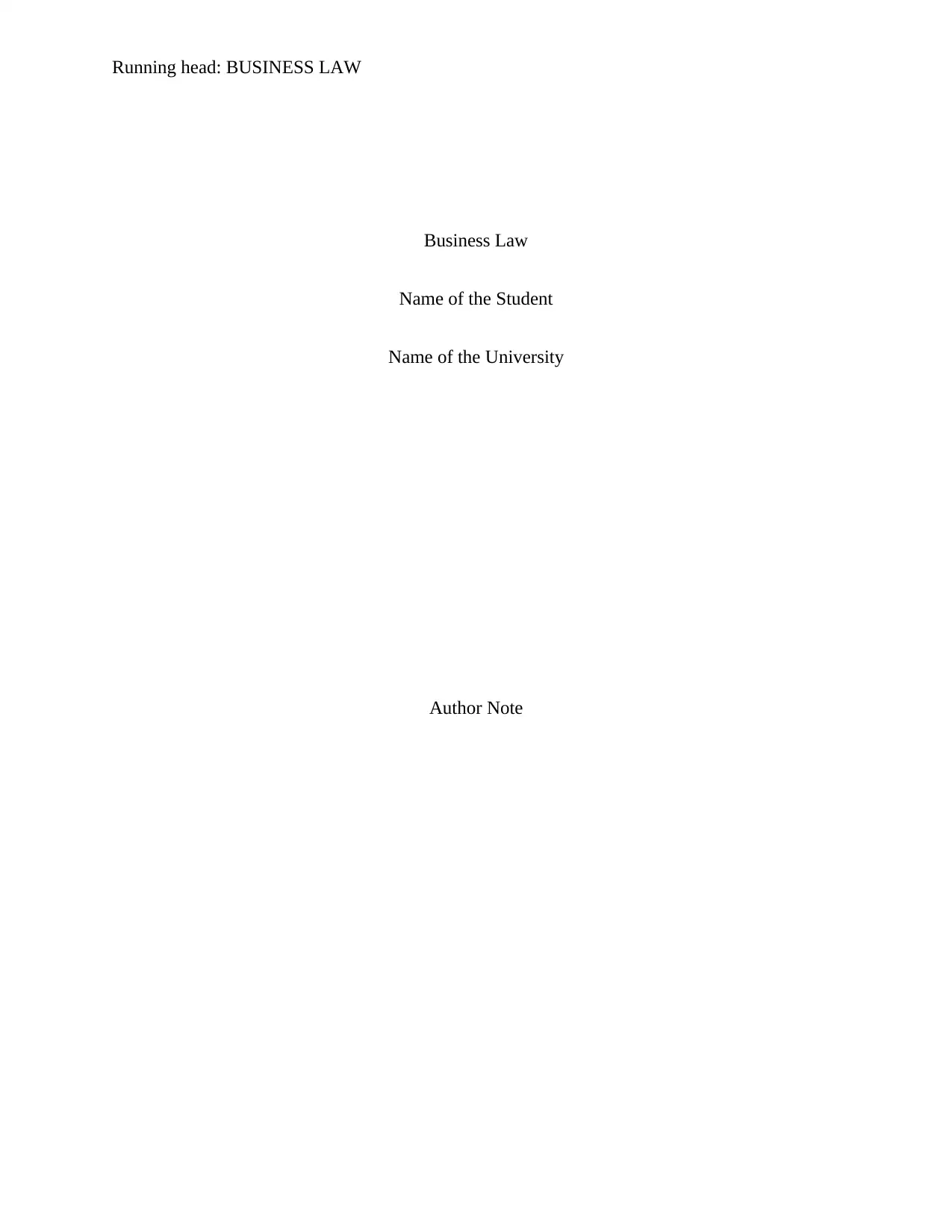
Running head: BUSINESS LAW
Business Law
Name of the Student
Name of the University
Author Note
Business Law
Name of the Student
Name of the University
Author Note
Paraphrase This Document
Need a fresh take? Get an instant paraphrase of this document with our AI Paraphraser
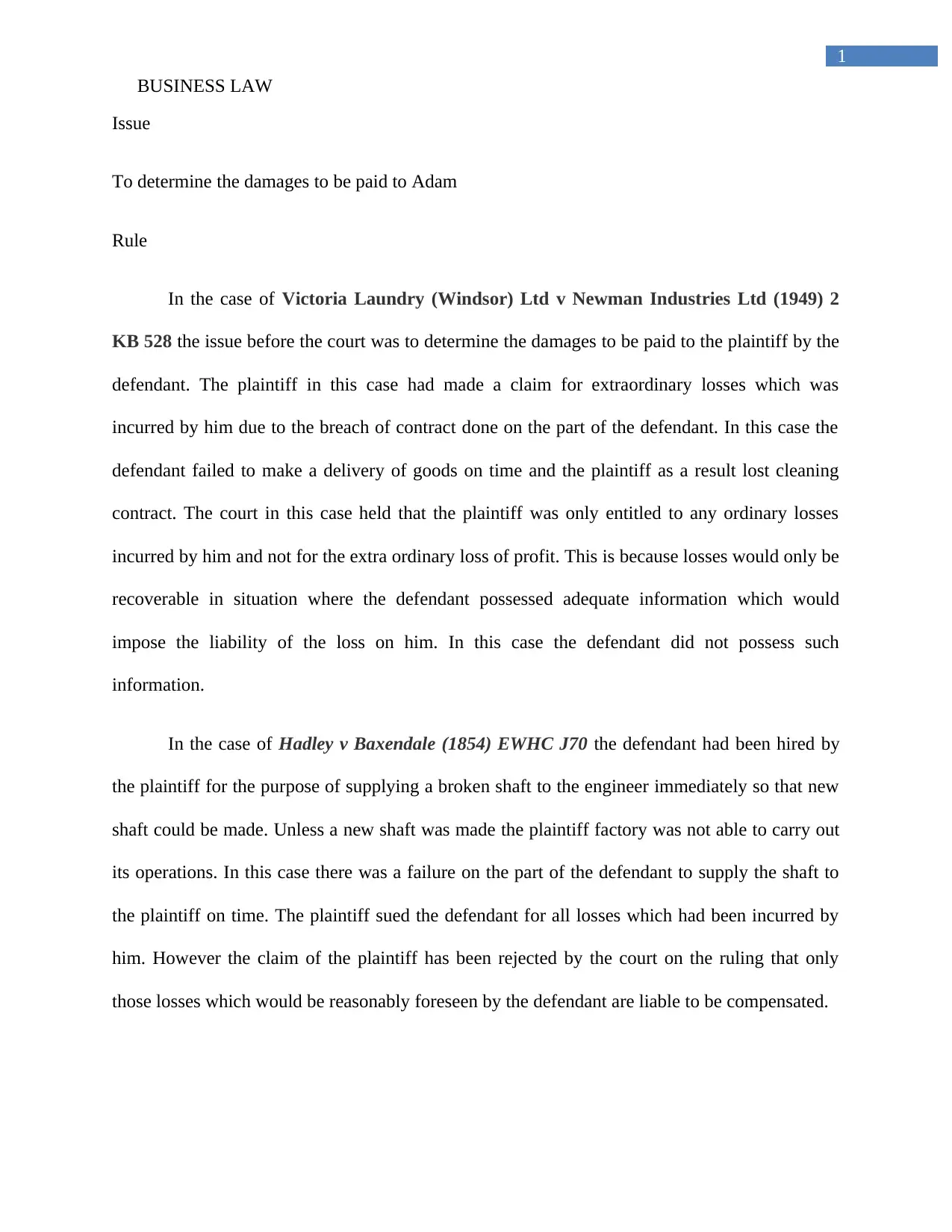
1
BUSINESS LAW
Issue
To determine the damages to be paid to Adam
Rule
In the case of Victoria Laundry (Windsor) Ltd v Newman Industries Ltd (1949) 2
KB 528 the issue before the court was to determine the damages to be paid to the plaintiff by the
defendant. The plaintiff in this case had made a claim for extraordinary losses which was
incurred by him due to the breach of contract done on the part of the defendant. In this case the
defendant failed to make a delivery of goods on time and the plaintiff as a result lost cleaning
contract. The court in this case held that the plaintiff was only entitled to any ordinary losses
incurred by him and not for the extra ordinary loss of profit. This is because losses would only be
recoverable in situation where the defendant possessed adequate information which would
impose the liability of the loss on him. In this case the defendant did not possess such
information.
In the case of Hadley v Baxendale (1854) EWHC J70 the defendant had been hired by
the plaintiff for the purpose of supplying a broken shaft to the engineer immediately so that new
shaft could be made. Unless a new shaft was made the plaintiff factory was not able to carry out
its operations. In this case there was a failure on the part of the defendant to supply the shaft to
the plaintiff on time. The plaintiff sued the defendant for all losses which had been incurred by
him. However the claim of the plaintiff has been rejected by the court on the ruling that only
those losses which would be reasonably foreseen by the defendant are liable to be compensated.
BUSINESS LAW
Issue
To determine the damages to be paid to Adam
Rule
In the case of Victoria Laundry (Windsor) Ltd v Newman Industries Ltd (1949) 2
KB 528 the issue before the court was to determine the damages to be paid to the plaintiff by the
defendant. The plaintiff in this case had made a claim for extraordinary losses which was
incurred by him due to the breach of contract done on the part of the defendant. In this case the
defendant failed to make a delivery of goods on time and the plaintiff as a result lost cleaning
contract. The court in this case held that the plaintiff was only entitled to any ordinary losses
incurred by him and not for the extra ordinary loss of profit. This is because losses would only be
recoverable in situation where the defendant possessed adequate information which would
impose the liability of the loss on him. In this case the defendant did not possess such
information.
In the case of Hadley v Baxendale (1854) EWHC J70 the defendant had been hired by
the plaintiff for the purpose of supplying a broken shaft to the engineer immediately so that new
shaft could be made. Unless a new shaft was made the plaintiff factory was not able to carry out
its operations. In this case there was a failure on the part of the defendant to supply the shaft to
the plaintiff on time. The plaintiff sued the defendant for all losses which had been incurred by
him. However the claim of the plaintiff has been rejected by the court on the ruling that only
those losses which would be reasonably foreseen by the defendant are liable to be compensated.
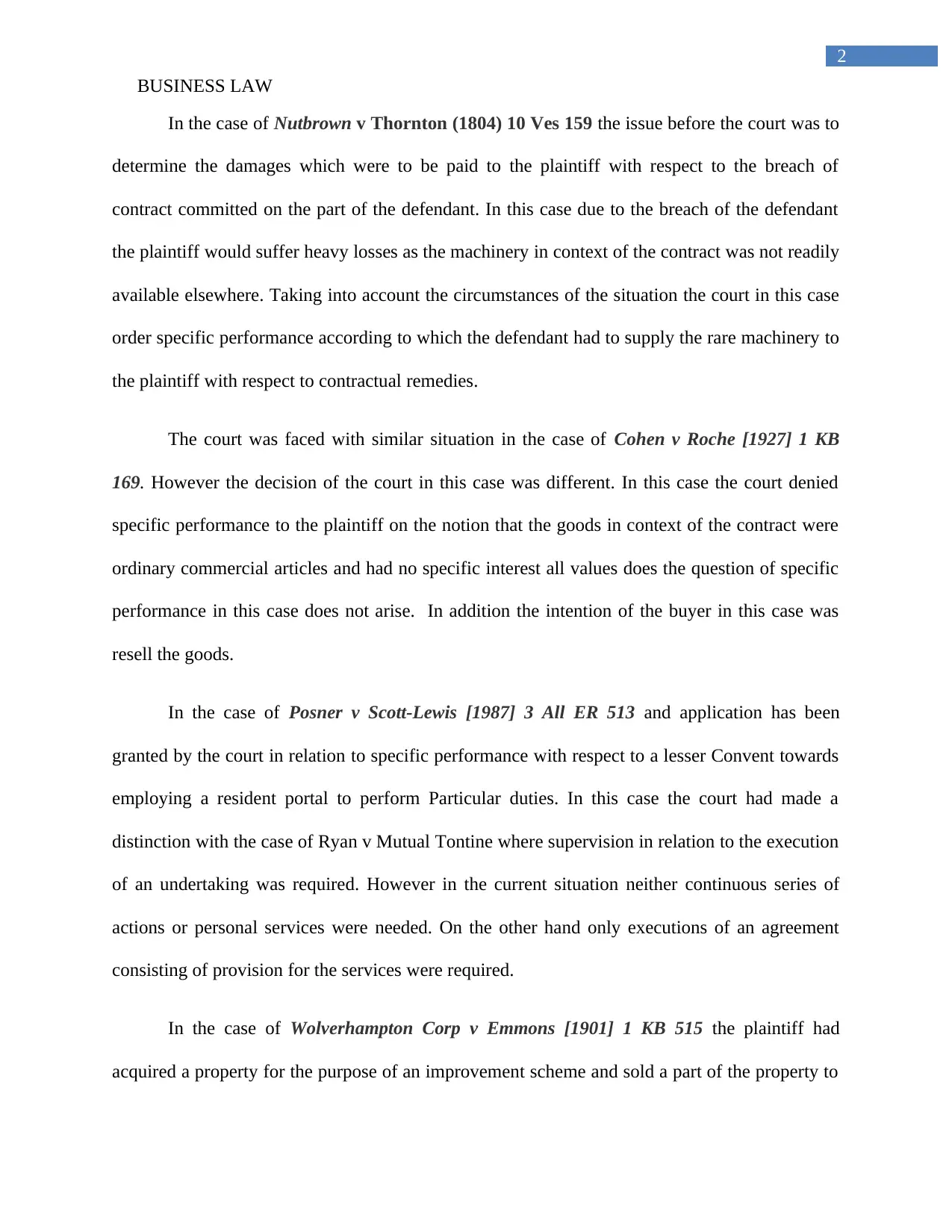
2
BUSINESS LAW
In the case of Nutbrown v Thornton (1804) 10 Ves 159 the issue before the court was to
determine the damages which were to be paid to the plaintiff with respect to the breach of
contract committed on the part of the defendant. In this case due to the breach of the defendant
the plaintiff would suffer heavy losses as the machinery in context of the contract was not readily
available elsewhere. Taking into account the circumstances of the situation the court in this case
order specific performance according to which the defendant had to supply the rare machinery to
the plaintiff with respect to contractual remedies.
The court was faced with similar situation in the case of Cohen v Roche [1927] 1 KB
169. However the decision of the court in this case was different. In this case the court denied
specific performance to the plaintiff on the notion that the goods in context of the contract were
ordinary commercial articles and had no specific interest all values does the question of specific
performance in this case does not arise. In addition the intention of the buyer in this case was
resell the goods.
In the case of Posner v Scott-Lewis [1987] 3 All ER 513 and application has been
granted by the court in relation to specific performance with respect to a lesser Convent towards
employing a resident portal to perform Particular duties. In this case the court had made a
distinction with the case of Ryan v Mutual Tontine where supervision in relation to the execution
of an undertaking was required. However in the current situation neither continuous series of
actions or personal services were needed. On the other hand only executions of an agreement
consisting of provision for the services were required.
In the case of Wolverhampton Corp v Emmons [1901] 1 KB 515 the plaintiff had
acquired a property for the purpose of an improvement scheme and sold a part of the property to
BUSINESS LAW
In the case of Nutbrown v Thornton (1804) 10 Ves 159 the issue before the court was to
determine the damages which were to be paid to the plaintiff with respect to the breach of
contract committed on the part of the defendant. In this case due to the breach of the defendant
the plaintiff would suffer heavy losses as the machinery in context of the contract was not readily
available elsewhere. Taking into account the circumstances of the situation the court in this case
order specific performance according to which the defendant had to supply the rare machinery to
the plaintiff with respect to contractual remedies.
The court was faced with similar situation in the case of Cohen v Roche [1927] 1 KB
169. However the decision of the court in this case was different. In this case the court denied
specific performance to the plaintiff on the notion that the goods in context of the contract were
ordinary commercial articles and had no specific interest all values does the question of specific
performance in this case does not arise. In addition the intention of the buyer in this case was
resell the goods.
In the case of Posner v Scott-Lewis [1987] 3 All ER 513 and application has been
granted by the court in relation to specific performance with respect to a lesser Convent towards
employing a resident portal to perform Particular duties. In this case the court had made a
distinction with the case of Ryan v Mutual Tontine where supervision in relation to the execution
of an undertaking was required. However in the current situation neither continuous series of
actions or personal services were needed. On the other hand only executions of an agreement
consisting of provision for the services were required.
In the case of Wolverhampton Corp v Emmons [1901] 1 KB 515 the plaintiff had
acquired a property for the purpose of an improvement scheme and sold a part of the property to
⊘ This is a preview!⊘
Do you want full access?
Subscribe today to unlock all pages.

Trusted by 1+ million students worldwide
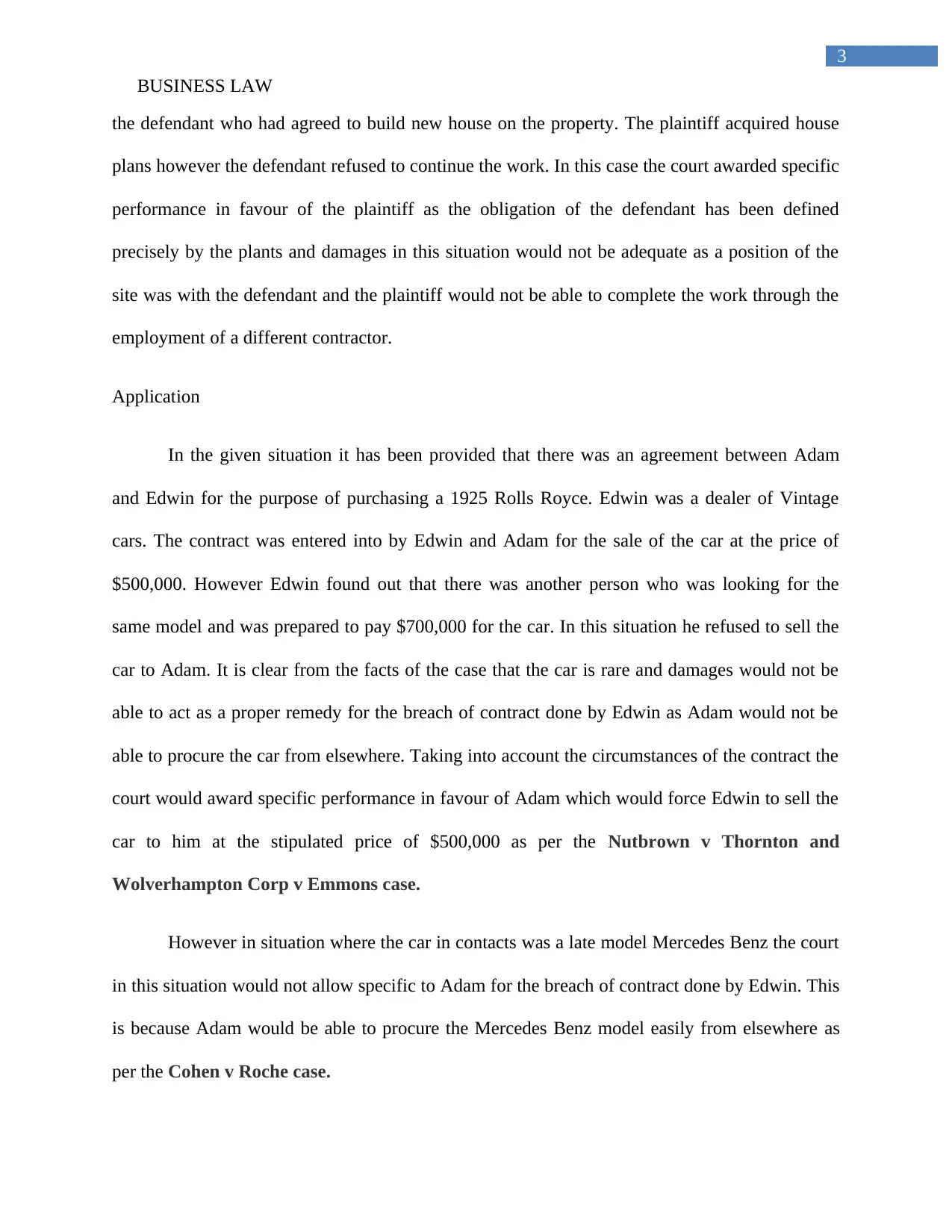
3
BUSINESS LAW
the defendant who had agreed to build new house on the property. The plaintiff acquired house
plans however the defendant refused to continue the work. In this case the court awarded specific
performance in favour of the plaintiff as the obligation of the defendant has been defined
precisely by the plants and damages in this situation would not be adequate as a position of the
site was with the defendant and the plaintiff would not be able to complete the work through the
employment of a different contractor.
Application
In the given situation it has been provided that there was an agreement between Adam
and Edwin for the purpose of purchasing a 1925 Rolls Royce. Edwin was a dealer of Vintage
cars. The contract was entered into by Edwin and Adam for the sale of the car at the price of
$500,000. However Edwin found out that there was another person who was looking for the
same model and was prepared to pay $700,000 for the car. In this situation he refused to sell the
car to Adam. It is clear from the facts of the case that the car is rare and damages would not be
able to act as a proper remedy for the breach of contract done by Edwin as Adam would not be
able to procure the car from elsewhere. Taking into account the circumstances of the contract the
court would award specific performance in favour of Adam which would force Edwin to sell the
car to him at the stipulated price of $500,000 as per the Nutbrown v Thornton and
Wolverhampton Corp v Emmons case.
However in situation where the car in contacts was a late model Mercedes Benz the court
in this situation would not allow specific to Adam for the breach of contract done by Edwin. This
is because Adam would be able to procure the Mercedes Benz model easily from elsewhere as
per the Cohen v Roche case.
BUSINESS LAW
the defendant who had agreed to build new house on the property. The plaintiff acquired house
plans however the defendant refused to continue the work. In this case the court awarded specific
performance in favour of the plaintiff as the obligation of the defendant has been defined
precisely by the plants and damages in this situation would not be adequate as a position of the
site was with the defendant and the plaintiff would not be able to complete the work through the
employment of a different contractor.
Application
In the given situation it has been provided that there was an agreement between Adam
and Edwin for the purpose of purchasing a 1925 Rolls Royce. Edwin was a dealer of Vintage
cars. The contract was entered into by Edwin and Adam for the sale of the car at the price of
$500,000. However Edwin found out that there was another person who was looking for the
same model and was prepared to pay $700,000 for the car. In this situation he refused to sell the
car to Adam. It is clear from the facts of the case that the car is rare and damages would not be
able to act as a proper remedy for the breach of contract done by Edwin as Adam would not be
able to procure the car from elsewhere. Taking into account the circumstances of the contract the
court would award specific performance in favour of Adam which would force Edwin to sell the
car to him at the stipulated price of $500,000 as per the Nutbrown v Thornton and
Wolverhampton Corp v Emmons case.
However in situation where the car in contacts was a late model Mercedes Benz the court
in this situation would not allow specific to Adam for the breach of contract done by Edwin. This
is because Adam would be able to procure the Mercedes Benz model easily from elsewhere as
per the Cohen v Roche case.
Paraphrase This Document
Need a fresh take? Get an instant paraphrase of this document with our AI Paraphraser
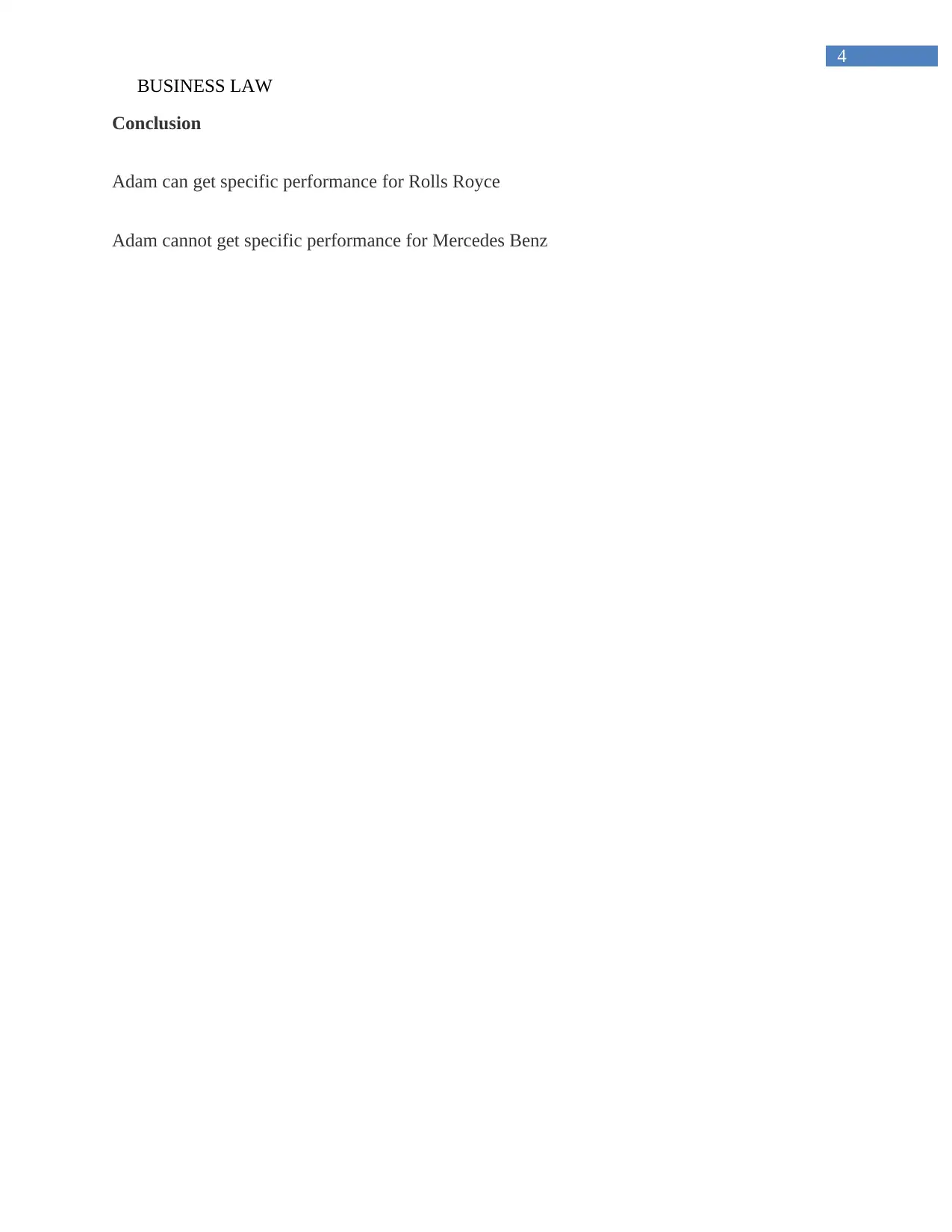
4
BUSINESS LAW
Conclusion
Adam can get specific performance for Rolls Royce
Adam cannot get specific performance for Mercedes Benz
BUSINESS LAW
Conclusion
Adam can get specific performance for Rolls Royce
Adam cannot get specific performance for Mercedes Benz
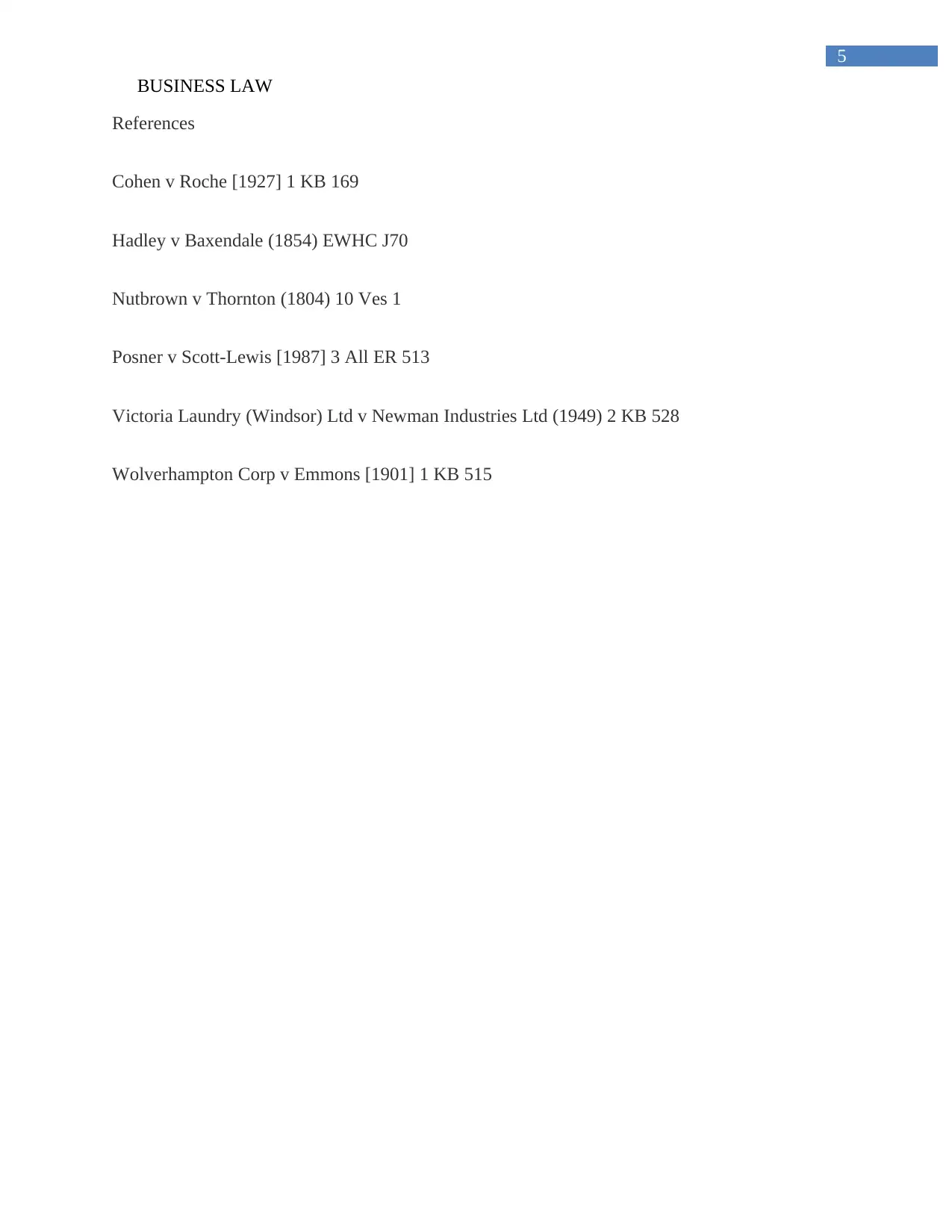
5
BUSINESS LAW
References
Cohen v Roche [1927] 1 KB 169
Hadley v Baxendale (1854) EWHC J70
Nutbrown v Thornton (1804) 10 Ves 1
Posner v Scott-Lewis [1987] 3 All ER 513
Victoria Laundry (Windsor) Ltd v Newman Industries Ltd (1949) 2 KB 528
Wolverhampton Corp v Emmons [1901] 1 KB 515
BUSINESS LAW
References
Cohen v Roche [1927] 1 KB 169
Hadley v Baxendale (1854) EWHC J70
Nutbrown v Thornton (1804) 10 Ves 1
Posner v Scott-Lewis [1987] 3 All ER 513
Victoria Laundry (Windsor) Ltd v Newman Industries Ltd (1949) 2 KB 528
Wolverhampton Corp v Emmons [1901] 1 KB 515
⊘ This is a preview!⊘
Do you want full access?
Subscribe today to unlock all pages.

Trusted by 1+ million students worldwide
1 out of 6
Related Documents
Your All-in-One AI-Powered Toolkit for Academic Success.
+13062052269
info@desklib.com
Available 24*7 on WhatsApp / Email
![[object Object]](/_next/static/media/star-bottom.7253800d.svg)
Unlock your academic potential
Copyright © 2020–2025 A2Z Services. All Rights Reserved. Developed and managed by ZUCOL.




